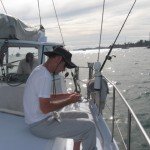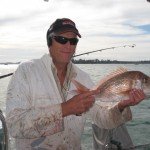19 March. The Hauraki Gulf.
Fuel Problems – what messing about in boats really means.
Fishing is one of my great passions. Nelson had been mediocre in delivering good feeds of snapper. Perhaps I should say my fishing techniques were not up to the more difficult regime in those cool waters. While sailing into the Waitemata Harbour, my wife had shouted to some fishermen ‘How is the fishing?’ To my astonishment, they held up a large golden snapper. I made a mental note to return to this exact spot, which was only a kilometer off Narrow Neck Beach.
The following weekend we set off from Westhaven Marina with our fishing-mad brother in law and his yachting–mad partner.
As we motored past the floating fuel station, I made a mental note to pay a visit there when we had no guests aboard. The trip from Nelson to Whangaroa via Wellington was a substantial distance. The West Coast aka Tasman Sea had been like a lake, and our reliable Nissan (the iron mainsail) had been plugging away for seventy hours. Read on.
Soon we were at spot X and turned into the tide to anchor. Just then the auxiliary spluttered to a halt. The anchor rattled down, baited fishing lines dropped, and I exposed the engine to analyze the problem. Big end bearing? Better not go that far. Diesels need only clean air, oil, and clean fuel. Oh, and they need to be kept running hard, with little idling – a fact lost on most boaties who idle their engines for hours without a load on.. The most likely cause would be air in the diesel. So while Bro-In-Law and the ladies began a pleasant and productive morning hauling in a good catch, I put head down and bum up. You might say it was not my preferred activity that morning as I listened to the squeals of delight as each golden fish was hauled aboard. However, the skipper must show some responsibility.
Like electrical problems, the solution requires some basic ‘noodling out’, a term for logically and sequentially solving the problem. Get to the end of the errant noodle and suck on it. In this case, the best idea would have been to confer with the Admiral and heed her suggestion. That is, check the tanks to see if there was actually diesel present. However, the ‘sight glass’ indicated a near full tank. I changed to the ‘full’ tank and pumped the bleed lever vigorously. I could hear the gurgling of air in the large water trap under the floor boards. Hmm. A perished fuel hose would let in air on the negative pressure section (the hose between the filters in the bilge and the pump on the engine). A new hose on that section provided a negative on that idea. Tighten fittings – no result. Change the filter next, since a rubber sealing ring might be perished or pinched. It needed doing, so no harm. Result, negative. At this stage, after an intimate session with one’s hot and oily motor in a rolling anchorage, the brain required a scan and defragmenting. The always right Admiral would have recommended a full format.
After gnashing of teeth and a welcome break fishing, the Admiral persuaded me that according to her calculations of hours run from Nelson (75), we should be out of fuel. The only way to confirm this, was to drop a weighted string down the fuel pipe and check the level. Of course, she was correct. We had motored a surprising number of hours. The Tasman had not lived up to its reputation as a maelstrom of stormy water. The excellent on line weather forecasts and a dollop of patience had ensured us a dream trip.
The great thing about puff boats is their ability to move around independent of the coast guard or friends. With a rattling of chain, some rope work and flapping of sails, we sailed off the anchor to nearby Oraki Bay where we anchored off the marina break water. Bro-in-law’s partner and I used the dinghy to purchase 30 litres of diesel in jerry cans so we could then motor Wild Bird in. $350 later I made a mental note to sail more often. Who knows, but yachts might become de rigueur in boating circles as peak oil approaches.
The exercise today had been one to remember. Don’t trust the sight glass, go for the first logical solution first, (listen to she who must be obeyed, the Admiral in this case) and keep your tanks full. It was useful in that we now know exactly the capacity of the tanks, and what the fuel consumption is. Above all, look on the bright side of life. The sun was shining in the gulf, the fridge was full of
fish, we had two very happy guests, and once again we discovered that messing about in boats threw up all sorts of surprises.



